
Guests
- Wallace "Gator" Bradleya former gang member turned community leader.
Salim Muwakkil reports on 21st Century Vote, an organization created by former members of Chicago’s largest street gang, Gangster Disciples. Wallace “Gator” Bradley, a former gang member turned community leader, praises the group for offering a more productive way for disenfranchised youth to channel their energy and take part in the political process. However, the police and mainstream media claim that the organization is simply an illegitimate front allowing the Gangster Disciples to gain more influence. Bradley defends 21st Century Vote as a group sincerely working to bring a stop to gang violence from the inside out, and steer young people away from crime. He views denouncement of their efforts from politicians and others as an obstruction to progress.
Transcript
AMY GOODMAN: You’re listening to Democracy Now! I’m Amy Goodman. And joining me in Chicago is my co-host, Salim Muwakkil, senior editor at In These Times and a contributing columnist at the Chicago Sun-Times. And Salim has been following this controversy surrounding a group of former gang members who are exerting their muscle politically in Chicago. Salim.
SALIM MUWAKKIL: Good morning, Amy.
AMY GOODMAN: Morning.
SALIM MUWAKKIL: Well, you know, today is the Illinois primary, and that’s part of the whole — the Rust Belt primaries. And one of the most contentious issues in today’s primary is, and particularly in the state’s 7th Congressional District, which is in Chicago’s Black community, is the presence of a group called 21st Century Vote. It’s an organization that was formed basically as a vehicle to gain political influence and mobilize the growing numbers of disaffected youth who are attracted to street gangs in the city. And there’s a huge number of youth who are attracted to these street gangs. But since the founders of the group 21st Century Vote are former members of the Gangster Disciples, which is Chicago’s largest street gang, or “nation,” as the gang members would say, police claim the group is merely a gang front. However, many community leaders and activists praise 21st Century Vote as a positive development, as something that is giving these youth, who have very little else, something positive to do and a productive way of channeling their energy.
Wallace “Gator” Bradley is one of those community leaders who praises the group, but the 43-year-old Bradley himself is a controversial figure. He’s an ex-inmate and a former Gangster Disciple enforcer himself. But he’s now the director of an organization called United in Peace, which is a group deeply involved in the gang truce movement, which is a movement that blossomed following the 1992 disturbances in Los Angeles. Bradley is a member of this group, a growing group, of Black men who — in L.A., they call them OGs or original gangstas, who are urging youth that admire them to channel their energies in more constructive ways. But, of course, the mainstream media and mainstream politicians deride their claims, and they claim that it’s a ruse to try to gain more influence.
Now, Wallace Bradley is here with us today, and he’s become controversial himself because he’s endorsed perhaps the most progressive candidate for the 7th Congressional District, and now his — the opponents of this candidate are using Gator Bradley’s endorsement as a mark of odium for the candidate.
Wallace, tell us a little bit about 21st Century Vote and why you think this organization and others like it across the country are becoming increasingly involved in political campaigns.
WALLACE ”GATOR” BRADLEY: Well, I think it’s because the African American community is the last ethnic group that is channeling anti-social behavior out of our community. What I mean by that, the Irish community had their gangs. They had a gang here, and it’s still here, as a matter of fact, called the Hamburgs. OK, Mayor Daley then was involved in the riots here in 1919, the race riots. A lot of their members went to the penitentiary and did wrong. But Mayor Daley’s father decided that he wanted to do something right in this community. And matter of fact, we’re using the story of Daley’s father, known as the Boss, to help us do the right thing. I think what made them all concerned is that crime pays. It doesn’t pay us, OK? The Gangster Disciples, unless they have 30,000 members or growth and development, you know, it’s not about Gangster Disciples [inaudible] —
SALIM MUWAKKIL: Growth and development, now, what does —
WALLACE ”GATOR” BRADLEY: Right.
SALIM MUWAKKIL: What do you mean by that?
WALLACE ”GATOR” BRADLEY: Growth and development is something positive put on their mind. You know, you grow, and you develop, OK? Gangster Disciples has a negative edge, like you’re trying to take something that doesn’t belong to you. So —
SALIM MUWAKKIL: So, you mean you’re using the initials, the GD —
WALLACE ”GATOR” BRADLEY: Right.
SALIM MUWAKKIL: — to put a new spin on the organization.
WALLACE ”GATOR” BRADLEY: Right, because one of the things you have to do is, if you’re trying to make something positive, you have to start off with something positive. OK? If it’s 30,000 members, and maybe a thousand of them may be off to illicit activity, that’s 29,000 that’s not involved in illicit activity. When you see that 10,000 individuals march downtown to keep the schools from closing, to keep the health clinics open in our community —
SALIM MUWAKKIL: And, in fact, that’s what happened.
WALLACE ”GATOR” BRADLEY: Right.
SALIM MUWAKKIL: 21st Century Vote organized a massive demonstration in Chicago’s Loop two years ago —
WALLACE ”GATOR” BRADLEY: Right.
SALIM MUWAKKIL: — and virtually shut the city down.
WALLACE ”GATOR” BRADLEY: Yeah, they did. You know, well, we did, you know, shut it down, but it was for a good reason. Mayor Daley was about to close the clinics in our community. So, therefore, by the youth marching down to keep the clinics open, they realized that it was an AIDS epidemic within their community. You follow what I’m saying? We’ve learned to make them issue-orientated. And if one realize that it’s issues like education and healthcare, they realize that, hey, it’s best to go to school, and it’s not good to kill one another.
SALIM MUWAKKIL: But the police have insisted that these efforts are basically ruses, that they’re attempts by older gang members to influence young people and to put up a front —
WALLACE ”GATOR” BRADLEY: Right.
SALIM MUWAKKIL: —of respectability.
WALLACE ”GATOR” BRADLEY: You know, but, you know, my thing is this. They don’t say anything about the Irish gangs. They don’t say anything about the Jewish gangs. They don’t say anything about the police gangs. But during the peace summit that we had in Chicago, the mayor was against African Americans stopping killing one another. The state’s attorney, the U.S. Attorney’s Office —
SALIM MUWAKKIL: When you say “peace summits”?
WALLACE ”GATOR” BRADLEY: The peace summits that we went across the country and met with gang leaders from around the country, Chicanos, Asians, white gang leaders, motorcycle gang leaders. Everyone came together, and it was about stopping the unwanted killing that was happening in the community. Innocent individuals were getting hurt, OK? After Dantrell Davis got killed —
SALIM MUWAKKIL: In Chicago.
WALLACE ”GATOR” BRADLEY: In Chicago.
SALIM MUWAKKIL: Seven-year-old kid who was shot.
WALLACE ”GATOR” BRADLEY: Seven-year-old kid, yeah, over in Cabrini-Green. Since we put the peace summit together, you know the truth: It hasn’t been any homicides over there since ’92. OK? So, when they realize that people like Gator — and I have support from Minister Farrakhan, Jesse Jackson, Prince Asiel, Rabbi Ben Ammi up out of Israel, you know, the Afro-American Hebrews, Ben Chavis, got support from Kweisi Mfume, you know, because it was the right
thing to do.
SALIM MUWAKKIL: And you you’ve even recently gained some mainstream support. I think the Chicago Urban League has —
WALLACE ”GATOR” BRADLEY: Yeah.
SALIM MUWAKKIL: — enlisted —
WALLACE ”GATOR” BRADLEY: Of course. Well, you know, first of all, before everybody joined with us, I even went and met with President Clinton in the Oval Office, OK, a day before he gave his State of the Union address, in order to find solutions to urban problems.
SALIM MUWAKKIL: Well, he didn’t — apparently, he didn’t listen to what you said.
WALLACE ”GATOR” BRADLEY: No, he did.
SALIM MUWAKKIL: He didn’t even mention the urban situation.
WALLACE ”GATOR” BRADLEY: Right. Well, you know, he feel that he doesn’t have to. OK?
SALIM MUWAKKIL: And is it — is it the intention of groups like 21st Century Vote to make these politicians respond to situations [inaudible] —
WALLACE ”GATOR” BRADLEY: Right. I think what it is, what has to happen, elected officials have to be held accountable to their constituency, the same way they want to hold gang members accountable for the — what can I say? — the bad things happening in the community. They say, “OK” —
SALIM MUWAKKIL: And aren’t gang members — shouldn’t they be held accountable?
WALLACE ”GATOR” BRADLEY: They should be held — they should be held accountable. Everyone should, OK? But to me, when I see them jumping all over James Compton —
SALIM MUWAKKIL: Who’s the executive director of the Urban League.
WALLACE ”GATOR” BRADLEY: — who’s the executive director of the Urban League, because he’s doing what his mission statement states that he must do — he’s receiving funds to reach out to disenfranchised youth, to turn them around to something positive. And when I see that the Illinois Crime Commission, that has no law enforcement, you know, type of thing, just got a name, want to tell the — I think it was the United Way, not to give any money to the Urban League because they are working with the youth, 21st Century Vote and with a powerful coalition, only to have them registering to vote, not to have them do anything else but to register people and to vote. And I feel like, since this supposed to be a democracy, what do you want them to do? Do you want them to shoot one another, or do you want them to vote?
SALIM MUWAKKIL: And, Wallace, that’s a very good question, and it’s one that comes to mind frequently when I hear politicians denounce these efforts by groups like 21st Century Vote. Why do you think there’s such relentless opposition to your attempts to become legitimate players in the political realm?
WALLACE ”GATOR” BRADLEY: Right. Well, first of all, a lot of the elected officials, African American elected officials, they were just like us in the '60s. OK? I'm 43. I stood on a lot of picket lines with them. OK? They got into office, and they don’t care. They live in a vacuum there. OK, I got grandchildren. OK? 21st Century is about cyberspace, you know, the internet. OK? The reason that the name 21st Century Vote came into play is because it was putting it on the youth’s mind they’re going into the 21st century in order to be voices — that’s V — of total empowerment — that’s O-T-E. You know, dealing with with the mind, they may call it subliminal —
SALIM MUWAKKIL: Seduction?
WALLACE ”GATOR” BRADLEY: Yeah, you know, or suggestion.
SALIM MUWAKKIL: OK.
WALLACE ”GATOR” BRADLEY: You follow what I’m saying?
SALIM MUWAKKIL: I understand. Are there similar efforts like this in other cities?
WALLACE ”GATOR” BRADLEY: Yes, it is. Yes, it is, in Washington, D.C., in L.A. I mean, we ended up in the World Book Encyclopedia in 1994 because we did the summits from Kansas City to California to Cleveland to Minneapolis, St. Paul, Minnesota, to Detroit, Chicago, ran for five days. And doing each time we had a summit in an individual city —
SALIM MUWAKKIL: This was the peace summit, the gang peace summit.
WALLACE ”GATOR” BRADLEY: This was the peace summits.
SALIM MUWAKKIL: And this kind of — this political development grew out of these peace summits.
WALLACE ”GATOR” BRADLEY: It did. It did. You know how some people always have the conventions, and they have an agenda and say what they’re going to do. OK, we had an agenda. Our purpose was to make the schools safe, OK, not just for our children, for all children. If an individual in one of the organizations wanted to go to school, he had, like, carte blanche. He must go to school. You feel what I’m saying? What you need? You need some books, or you need a bookcase? We got to get that for you. And the fact that no one was to stalk a woman, you know, disrespect a senior citizen, OK, weren’t supposed to abuse any children.
SALIM MUWAKKIL: And these are —
WALLACE ”GATOR” BRADLEY: OK, they were to register.
SALIM MUWAKKIL: These are bylaws in the group.
WALLACE ”GATOR” BRADLEY: Right, right. And every town was about it. As a matter of fact, the Million Man March was pretty much what came out of the summit, because Farrakhan was going to speak at each town and saw how the brothers was coming together. I mean, we’re just like conventioneers. We had our little ID cards, and we worked with the police in the community — you feel what I’m saying? — the superintendent of police in every town that we had a summit. We dealt with the mayor, the State’s Attorney’s Office. But the thing that gets me in Chicago, the biggest gang in this town is Fraternal Order of Police, you know?
SALIM MUWAKKIL: Right. Well —
WALLACE ”GATOR” BRADLEY: And I’m just saying that to say, in this town, you have a state’s attorney. They know that a police officer killed a homeless man, murdered him. And then, through the manipulation of his office, he obstructed justice, OK?
SALIM MUWAKKIL: OK, yeah.
WALLACE ”GATOR” BRADLEY: Only because they were members of the Fraternal Order of Police.
SALIM MUWAKKIL: Well, that’s true, and that’s another issue we may deal with in the future. But one other thing I wanted to say about about this group is so many young Black men are becoming involved with the criminal justice system. The Sentencing Project has released statistics citing the figure, that startling figure, 1/3 of all young Black men in their twenties. And this seems to be an attempt to redirect the lives of these young Black men —
WALLACE ”GATOR” BRADLEY: Right.
SALIM MUWAKKIL: — who you come into contact with.
WALLACE ”GATOR” BRADLEY: It is, because, like I said earlier, crime pays for them. For each individual that we’re able to stop from going to the penitentiary, that’s $30,000 of taxpayers’ money that they don’t have to spend to a contractor who may have got a no-bid contract. OK? Since they got the crack law, that’s five years mandatory. So, you figure that’s $150 — I mean $150,000 per individual. If you stop 10, that’s $1.5 million. Now you got General Electric and EF Hutton and all of them investing in the penitentiaries. And they invest their money for profit lines. And they’re the same individuals that donate money to the legislative body to make laws to lock individuals up.
SALIM MUWAKKIL: Very good point, Wallace. Any questions, Amy, from your end?
AMY GOODMAN: Yes, I do have a question. Let me ask you something, Gator. Danny Davis, the candidate, the most progressive candidate in the 7th District congressional race in Chicago that you endorsed, how did he receive your endorsement?
WALLACE ”GATOR” BRADLEY: Well, see, first of all, Amy, all the candidates that came to me for support — and that’s what I really hate. I hate the hypocrisy. I even have Ed Smith on video coming to me for support.
SALIM MUWAKKIL: Who’s one of Davis’s opponents.
WALLACE ”GATOR” BRADLEY: Right, who’s one of Davis’s opponents. OK? Bobbie Steele is one of his opponents, and have a smear campaign going on, like the man is supporting a drug cartel. And that is a lie. And she came to me for support. I campaigned for her across the whole city. That’s how she became the Cook County commissioner. And I’m like, if I was good enough to help you get elected, how could I be wrong to support the most progressive candidate in this city? Because he does not have the Irish mafia pulling his string.
SALIM MUWAKKIL: But he received your report — he welcomed your support.
WALLACE ”GATOR” BRADLEY: Yeah, he did, because he did not solicit my support. That was one of the reasons why I went to him. And see, by me — they’ve got to understand, I worked with Jerry Butler for six years, so I’ve been in —
SALIM MUWAKKIL: Jerry Butler is the former singer who’s become a Cook County commissioner.
WALLACE ”GATOR” BRADLEY: Right. I was his administrative assistant for six years. OK? In 1988, I worked on Jesse Jackson’s campaign. At the convention in '88, I was on his staff. You feel what I'm saying? So I know the intricacies of politics, and I know how to research a candidate, instead of just going with him, OK? And when I realized that all the other candidates that was running against Danny, either Daley was pulling their strings, Alderman Burke, Thompson or Gary LaPaille.
SALIM MUWAKKIL: All of these are machine candidates.
WALLACE ”GATOR” BRADLEY: All these are machine candidates. They’re what we call the Irish mafia. They got control of everything. You follow what I’m saying? They represent 4% of the electorate, but they got control of every office.
SALIM MUWAKKIL: Yes.
AMY GOODMAN: Well, we hope to continue this discussion at future points, see how these politics play out in Chicago. Salim Muwakkil, I want to thank you for joining us from Chicago.
SALIM MUWAKKIL: Thank you, Amy.
AMY GOODMAN: Salim Muwakkil, again, senior editor at In These Times and a columnist with the Chicago Sun-Times. And also, thank you very much to Wallace “Gator” Bradley, joining us from Chicago. And you’ve been listening to Democracy Now! It’s produced by Julie Drizin, with assistance from Pat Greenfield. Our engineer is Kenneth Mason, and you can reach us via email at democracy@pacifica.org. That’s democracy@pacifica.org. You can also write to us here in Washington. We are Democracy Now!, 702 H Street Northwest, Washington, D.C. 20001. Tomorrow on Democracy Now!, a conversation with Ohio Representative Marcy Kaptur, one of NAFTA’s leading opponents on Capitol Hill. And later this week and next, we’ll be taking a look at the anti-toxics movement around this country. I’m Amy Goodman. Thanks for joining me on Pacific Radio’s daily election show, Democracy Now!

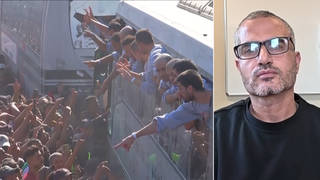
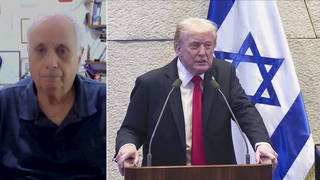
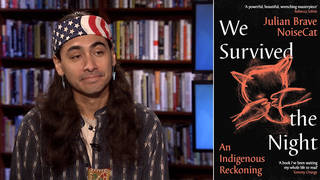
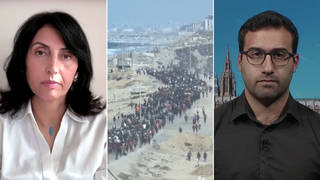





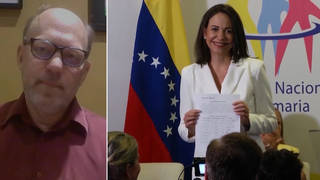
Media Options